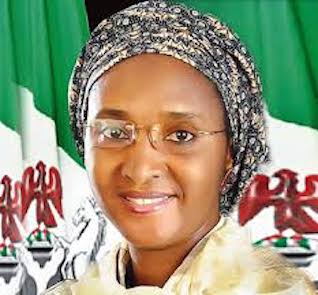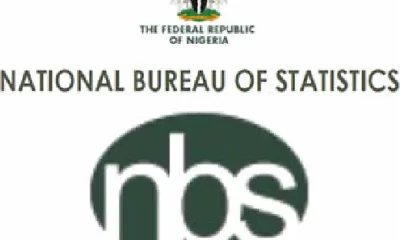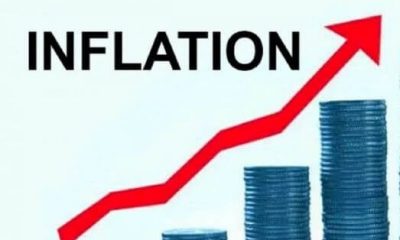Economy
Gains of Border Closure Outweigh Rising Inflation – FG

By Mathew Dadiya, Abuja
The Federal Government has said that the benefits of the border closure have outweighed the rising inflation.
The government however, assured that the measure was temporary and that the neighboring countries have been told to respect the ECOWAS protocols to enable the reopening of the borders.
Minister of Finance, Budget and National Planning, Mrs. Zainab Ahmed, said this while fielding questions from State House correspondents at the end of the Federal Executive Council (FEC) meeting on Wednesday, presided over by President Muhammadu Buhari in Abuja.
Mrs Ahmed said this also explained that the benefits of the border closure outweigh any the consequences.
Though the minister admitted that the closure of the nation’s borders played a major role in the rising inflation.
However, Ahmed added: “I need to remind us that the border closure is temporary. We have really advanced in our discussions between ourselves and our neigbours. We expect that the outcomes of those discussions and agreements is that each party will respect the protocols that we all committed to and then the borders will be opened again.
“What we are doing is important for our economy. We signed up to the African Continental Free Trade Area (AfCFTA) agreement, we have to make sure that we put in place checks to make sure that our economy will not be overrun as a result of the coming into effect of the AfCFTA.
“That is why we have this border closure to return to the discipline of respecting the protocols that we all committed to.”
Also speaking on the issue, Minister of information and Culture, Lai Mohammed, further explained that the border closure was necessary as Nigeria could not afford to continue to subsidize West Africa.
“You see, the issue of border closure and I think it will be quite misleading and will not serve the real purpose if our headlines tomorrow is that inflation is as a result of border closure.
“The border closure frankly speaking is what we needed to do and we had to do it. We cannot continue to subsidize the rest of West Africa. And the benefits for border closure for me, I think far surpasses the very little increase in inflation.
“We have been able to save about 30 percent from our fuel consumption which means that over time, we have been subsidizing the fuel consumption of other countries.
“Within the last three months, we have been able to increase by 15 percent duties collected from
Import. Within the same period and this is very important, we have been able to drastically reduce the volumes of arms and ammunition that have been coming into the country through smuggling, ditto with illicit drugs.
“All Nigeria is saying, please let’s respect the protocol on transit. ECOWAS set up a protocol on transit goods, which is very simple. If a container meant for Nigeria is dropped in Cotonou, the authorities in Benin Republic should escort the container to customs in Seme border, and that way proper duty will be levied and will be paid.
The National Bureau of Statistics (NBS) had in its recent report, indicated that Nigeria’s annual inflation rate was said to have increased to 11.61 per cent in October 2019 from 11.24 per cent in the previous month, reaching the highest since May of 2018.
It was also reported that prices rose mainly for food.
The minister said: “On inflation, headline inflation declined every month for several months before we noticed an uptake in the last two months. And now headline inflation is at about 11.61 percent as at the end of October.
“The slight increase in this inflation between September and October is due to food inflation. The food inflation we are ascribing to prices of cereals, rice and fish, and part of the reason is the border closure.
But the border closure is very very short and temporary and the increase is just about two basic points.
“Remember there was a time inflation was nine percent and it grew to about 18 percent in January 2017 when we were in recession.
The relationship between inflation, interest rates and growth is managed by the monetary authorities and is a management that is tracked on a regular basis.
“So, if you reduce interest rate, you expect more borrowing for investments in the real sector. But at the same time, that also has the tendency of reducing money that is used for consumption on a day to day basis.
“So, it’s a balance that we continue to watch on a regular basis. We expect that this will be moderated as border closure impact fizzles out and also as the monetary authorities continue to support the MPR rate, therefore ensuring that interest rates are not on the high side.”
“But on the contrary, what we have seen happening… and the protocol said, you cannot break the seal, you cannot open the container. But what has been happening over the years is that our neighbours, will transit the container, put about five containers on one truck and drive it to the border as if it is only one container that they are going to pay duties on.
“Worse still, less than even 50 percent of what is meant for Nigeria will come through the approved border.
“So, what we have done and it has maximum effect is ask our neigbours to respect the protocol on transit. if they do that the borders will be opened. But you cannot continue to play the big brother at the expense of national security at the expense of our national economy. “
Economy
SEC Advocates Advanced Financial Inclusion by 2030

By Tony Obiechina, Abuja
The Securities and Exchange Commission (SEC) has stressed the need for Nigeria to harness its demographic dividend to advance financial inclusion through investments by 2030 for national survival or face deepening inequality.
The Director-General of the SEC, Dr Emomotimi Agama said this at the United Capital Asset Management Investment forum on Wednesday in Lagos.
Agama, in his keynote address titled: “Advancing Financial Inclusion through Investments: Bridging
Nigeria’s Knowledge and Wealth Gap,” said Nigeria must harness its demographic dividend to boost investment.
“Our theme, Advancing Financial Inclusion through Investments, is not aspirational; it is foundational to national survival.
“We stand at a pivotal moment. By 2030, Nigeria can either harness its demographic dividend or face deepening inequality. The knowledge-wealth gap is not merely an economic challenge; it is a moral imperative,” Agama said.
He said the term inclusion should be reframed as active financial involvement, where access meets empowerment, and capital becomes a tool for transformation.
Agama said that closing the financial inclusion gender gap could lift 700,000 Nigerians from poverty.
He said, “Nigeria has a great population yet we have a tiny drop of this number of persons involved in the capital market.
“That one reason for poverty, because we are running from money. We have to do something. Our market capitalisation is an opportunity to do something,
We all have
“We need to change the narrative and move the market forward. We must reach out to make the difference. We are committed to protecting investors and developing the market. Our goal is to do the right thing no matter whose ox is gored. We will work by the principles of fairness and equity to change the market. We will provide a fair ground for everyone to aspire.
He noted that MTN Nigeria’s share offering drew 150,000 new investors – 75 per cent women, 85 per cent under 40.
Agama recommended a four-pillar strategy for bridging the gaps.
He listed the four-pillar strategy as democratisation of financial knowledge, catalyse MSME Investment Channels, blended Finance Vehicles: Partner with Bank of Industry (BOI) to de-risk loans for women-led SMEs.
“We need to educate people about finances. As we drive this market, we do so for a purpose, I enjoin everyone to be the disciple and the apostles. Getting this market to move is a deliberate action,” he added.
| ReplyReply allForwardAdd reaction |
Economy
NPA Assures of Over N1.27trn Revenue in 2025

By Ubong Ukpong, Abuja
The Nigerian Ports Authority (NPA) on Monday assured that it would take into the coffers massive revenue of over N1.27 trillion in 2025, representing a 40 percent increase from the N894.86 billion it realized in 2024.
This ambitious target, the Authority said, was anchored on sweeping modernization efforts, the full activation of the Dangote Refinery’s marine operations, and the deployment of cutting-edge technology to enhance port efficiency.
Managing Director of the NPA, Abubakar Dantsoho, disclosed this in a presentation during his agency’s budget defence session wih the House of Representatives Committee on Ports and Harbours, where he defended the agency’s 2025 budget estimates and provided insights into its 2024 performance.
“Our 2025 budget proposal is more than figures, it reflects our aspirations for a more efficient, globally competitive port system,” Dantsoho told lawmakers, adding that over 70% of the proposed expenditure will go into capital projects.
For 2024, the Authority surpassed its revenue target of N865.39 billion, posting an actual realization of N894.86 billion.
However, Dantsoho revealed that only N417.86 billion, less than half of the approved N850.92 billion expenditure, had been spent as of the time of reporting.
Despite this, NPA made a record contribution of N400.8 billion to the Consolidated Revenue Fund (CRF) in 2024, nearly double the N213.23 billion remitted in 2023. Of this amount, a staggering N344.7 billion was deducted at source.
“This shows our unwavering commitment to national revenue generation, even when our own operational liquidity is affected,” the NPA boss stressed.
Dantsoho said the projected revenue increase is premised on several key assumptions and developments, including: The full operation of the Dangote Refinery, which alone is expected to draw in over 600 vessels annually through its Single Point Mooring (SPM) system; the commissioning of upgraded terminals at WACT and OMT, which will enhance container traffic; the implementation of automation tools such as the National Single Window, Port Community System (PCS), and Vessel Traffic Management System (VTMS); and increased cargo volumes stemming from global disruptions, including the Russia-Ukraine conflict, which has affected global trade routes.
He said the 2025 revenue is expected to come from the following key sources: Ship Dues, N544.06 billion; Cargo Dues, N413.06 billion; Concession Fees, N249.69 billion; and Administrative Revenue, N73.07 billion
Of the proposed N1.14 trillion total expenditure for 2025, N778.46 billion is earmarked for capital projects.
This investment, he said, will target the revitalization of critical infrastructure, including the Calabar, Warri, and Burutu ports and channels, and enhance towage services, channel depth, and compliance with international security conventions.
“Investments in infrastructure and technology are non-negotiable if we are to stay competitive regionally and globally,” Dantsoho emphasized.
He cited increasing competition from neighboring ports and aging assets across Nigeria’s coastal corridors.
The NPA also intends to address technology gaps by upgrading legacy systems and bolstering cybersecurity, ensuring Nigerian ports meet global standards for digital operations.
“We can say that with timely access to internally generated revenue and capital funds NPA would deliver the kind of impact Nigeria expects,” he said.
Chairman of the Committee, Hon. Nnolim Nnaji, urged the NPA to ramp up performance, improve port infrastructure, and play a greater role in addressing Nigeria’s revenue and unemployment challenges.
Nnaji said the ports remain a critical pillar of Nigeria’s economy, and urged the agency to meet rising expectations despite operational challenges.
“No country can thrive economically without high-performing ports. They are the economic heartbeat of every nation, determining how buoyant a country is through the flow of imports and exports,” Hon Nnaji said.
The committee praised NPA for its performance.
Nnaji stressed that the NPA’s performance has implications beyond maritime activity, noting that increased port output can significantly boost job creation across several sectors.
“The Nigerian Ports Authority is not just a revenue-generating agency, it is a national asset in terms of employment and economic impact.
“We expect to see detailed strategies on how to improve revenue generation and expand employment opportunities through your 2025 budget,” he said.
The lawmaker also pointed to growing interest in the development of new ports across the country but cautioned against neglecting existing port infrastructure.
“As we welcome investment in new ports, we must not abandon the old ones. Maintaining and upgrading our existing ports, both in the Eastern Corridor and the Western axis, is essential to long-term sustainability,” he added.
The Committee called for a clear outline from the NPA on how its 2025 financial plan will address pressing national concerns and reaffirm Nigeria’s competitiveness in regional and global maritime trade.
Economy
Senate Sets N10trn Revenue Target for NCS, Urges Agency to Curb Smuggling, Illicit Drugs

By Eze Okechukwu, Abuja
The Senate, through its Committee on Customs has set a revenue target of N10 trillion for the Nigeria Customs Service for the 2025 fiscal year, instead of the initial N6.584 trillion given to her earlier on while urging the agency to clamp down on smuggling and Illicit drugs.
The Chairman of the Committee, Senator Isah Jibrin (Kogi East), who gave the agency the marching order yesterday in Abuja during the budget defence of the revenue driving agency however commended her for exceeding its 2024 revenue target of N5.
079 trillion.The NCS team led by Deputy Comptroller General, Jibo Bello who represented the Comptroller General presented the 2024 budget performance with a revenue target of N5.
079 trillion, stressing that the proposal was exceeded by over a trillion naira.The Committee, obviously impressed by the performance commended NCS before asking them to go ahead and present the 2025 budget proposal, which the agency tied at N6.584 trillion revenue target with an expenditure of N1.132 trillion.
Following their presentation, members of the Senate Committee on Customs unanimously approved the recommendation of the revenue target of N6.584 trillion and the expenditure of N1.132 trillion for the 2025 financial year.
The Committee will subsequently present the budget proposal to the Senate at plenary most likely this week as the red chamber resumes today after a long recess tied to Eid celebration.
In his final remarks, Senator Jibrin emphasised the need for the NCS to rise up in terms of its surveillance with respect to illicit drugs and smuggling “to ensure that, as much as possible, you should be on top of your game”.
He said there are so many illicit drugs flowing all over the place, which according to him “is contributing to the issue of banditry in Nigeria because most of these guys are on drugs. What I’m saying is that, in addition to your revenue drives, you should also be mindful of some of these other functions.






























